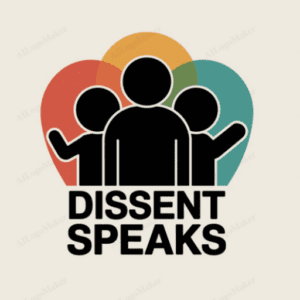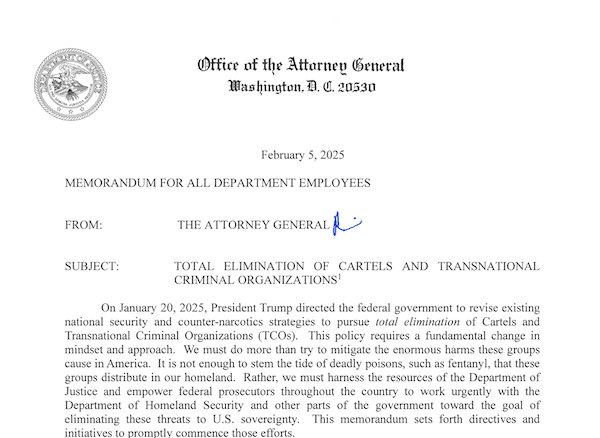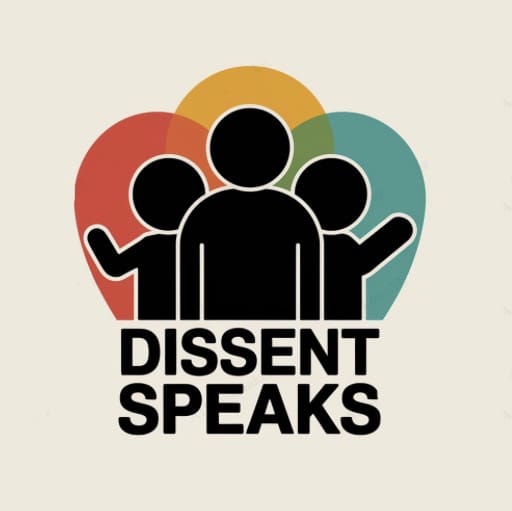An in-depth examination of the February 5, 2025 DOJ memorandum and its implications for civil liberties, due process, and American society
On February 5, 2025, the U.S. Department of Justice issued what may be one of the most aggressive and far-reaching law enforcement directives in recent memory. The memorandum, titled “Total Elimination of Cartels and Transnational Criminal Organizations,” marks a dramatic shift in how the federal government approaches drug cartels and organized crime—one that legal experts and civil rights advocates say could have profound implications for civil liberties and due process rights in America.
The Core Directive
The memorandum, issued under President Trump’s administration, explicitly calls for a “fundamental change in mindset and approach” toward tackling drug cartels and transnational criminal organizations (TCOs). Its stated goal is not merely to mitigate harm or reduce drug trafficking, but to pursue “total elimination” of these groups—language that several legal scholars have noted bears more resemblance to military doctrine than traditional law enforcement policy.
As stated in the memorandum’s opening paragraph: “We must do more than try to mitigate the enormous harms these groups cause in America. It is not enough to stem the tide of deadly poisons, such as fentanyl, that these groups distribute in our homeland.”
Key Changes and Concerns
1. Suspension of Procedural Safeguards
Perhaps most concerning to civil rights advocates is the memorandum’s suspension of several long-standing legal safeguards, including:
- Mandatory pre-indictment review for capital-eligible offenses
- National Security Division approval requirements for terrorism charges
- Standard oversight procedures for racketeering cases
The document justifies these suspensions by claiming such cases present “extenuating circumstances” that “address public safety concerns.” However, these are precisely the types of high-stakes cases where additional oversight has traditionally been deemed most crucial.
2. Expanded Use of Terrorism Charges
The memorandum significantly broadens the application of terrorism charges against cartel members and associates, allowing prosecutors to proceed “in the absence of a specific nexus to drug trafficking or importation of contraband to the United States.” This expansion of terrorism charges without requiring direct links to terrorist activity represents a concerning departure from traditional legal standards.
3. Resource Reallocation
The order calls for dismantling several existing justice initiatives, including:
- Task Force KleptoCapture
- The Department’s Kleptocracy Team
- The Kleptocracy Asset Recovery Initiative
These resources will instead be redirected toward cartel elimination efforts, potentially weakening other important areas of law enforcement and oversight.
The Language of War
The memorandum’s rhetoric is notably militaristic, employing terms more commonly associated with warfare than law enforcement. This linguistic choice appears deliberate and mirrors what analysts have identified as a broader pattern in the administration’s approach to domestic law enforcement.
Dr. Sarah Martinez, a legal scholar at Georgetown Law, notes: “The use of terms like ‘total elimination’ and the framing of cartels as threats to ‘U.S. sovereignty’ represents a concerning shift toward treating law enforcement as a military operation. This kind of language can be used to justify extraordinary measures that might otherwise face greater scrutiny.”
Practical Implications
For Civil Liberties
The memorandum’s suspension of pre-indictment reviews and other oversight mechanisms could significantly impact due process rights, particularly for individuals who may only be tangentially connected to cartel activities. The broad definition of “associates” could potentially sweep up individuals with minimal involvement in criminal activities.
For Law Enforcement
The directive fundamentally changes how federal prosecutors approach cases, encouraging them to:
- Pursue maximum charges against suspected cartel leaders
- Expedite deportations for low-level suspects without immigration status
- Redirect resources from lower-level investigations to high-profile targets
For International Relations
The aggressive stance outlined in the memorandum has already raised diplomatic concerns, particularly with Mexico. As noted in the referenced El País article, this approach could strain bilateral cooperation and complicate international law enforcement efforts.
Is It Based on Fact or Propaganda?
A careful analysis of the memorandum reveals several concerning elements that suggest political messaging may have taken precedence over evidence-based policy:
- Lack of Data: The memorandum provides no empirical evidence to support its assertion that traditional law enforcement approaches have failed.
- Oversimplified Solutions: The “total elimination” goal, while politically appealing, ignores the complex socioeconomic factors that drive drug trafficking and organized crime.
- Militaristic Language: The use of war-like terminology appears designed to frame the issue in terms of national security threats rather than law enforcement challenges.
- Political Timing: The memorandum’s release coincides with broader political messaging about border security and crime, suggesting potential political motivations.
Actionable Steps for Concerned Citizens
1. Stay Informed
- Monitor implementation of the policy through reputable news sources
- Follow updates from civil rights organizations tracking the policy’s effects
- Pay attention to local implementation in your jurisdiction
2. Contact Representatives
- Write to your congressional representatives expressing concerns about civil liberties
- Request oversight hearings on the policy’s implementation
- Support legislation that maintains due process protections
3. Support Advocacy Organizations
- Engage with civil rights organizations monitoring the policy’s implementation
- Consider supporting legal defense funds for affected communities
- Join local criminal justice reform initiatives
4. Document and Report
- If you witness or experience effects of this policy, document them carefully
- Report concerns to civil rights organizations and legal advocacy groups
- Share verified information with community organizations
5. Engage in Community Dialogue
- Organize or attend community discussions about the policy’s local impact
- Work with local law enforcement to maintain community trust
- Support evidence-based alternatives to aggressive enforcement
Conclusion
The February 2025 DOJ memorandum represents a significant shift in federal law enforcement policy, one that raises serious concerns about civil liberties, due process, and the militarization of law enforcement. While its stated goal of combating dangerous criminal organizations is valid, the methods it proposes and the safeguards it removes could have far-reaching negative consequences for American society and the justice system.
The combination of militaristic language, suspended oversight, and expanded enforcement powers suggests a policy driven more by political messaging than evidence-based law enforcement strategy. As this policy begins its implementation, it will be crucial for citizens, civil rights organizations, and lawmakers to carefully monitor its effects and work to preserve essential legal protections.
This analysis is based on the original DOJ memorandum and supporting research documents, including international news coverage and legal analyses. All quotes and citations are drawn directly from the provided materials.
For updates and further information, consult civil rights organizations, legal advocacy groups, and official DOJ communications.
Style note: This article uses markdown formatting for headers and emphasis. The content is organized in a clear hierarchical structure to facilitate understanding of this complex topic.


